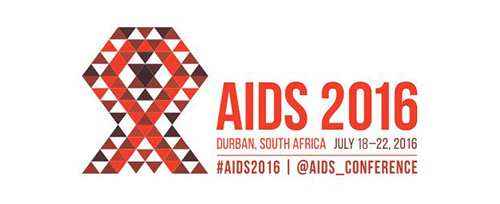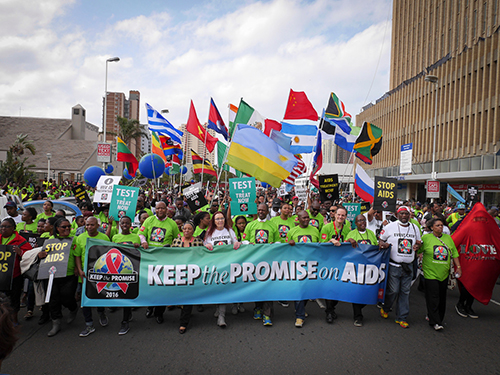
July 22, Durban, South Africa. The biennial conference, launched in 1985 at the peak of the AIDS epidemic, is the premier gathering for advocates, policymakers, NGO representatives, researchers, journalists, and people living with HIV, who discussed the progress and challenges of HIV in the region and around the world and ways to reinvigorate the response to the pandemic.

The AHF AIDS walk at the 21st International AIDS Conference in Durban, South Africa.
© International AIDS Society
The International AIDS Society, the world's leading independent association of HIV professionals, organized AIDS 2016 in collaboration with international, regional, and national partners. amfAR was a supporting partner and a co-sponsor of a pre-conference meeting on women and HIV and participated in many of the conference sessions.
Highlights from the conference include:
A new report on investments in cure research by the IAS HIV Cure resource tracking group and AVAC shows that global investment in cure research has more than doubled since 2012 to just over $200 million. The report references amfAR and our Countdown to a Cure for AIDS initiative.
Dr. Andrew Phillips of University College London estimates that a cure for HIV could potentially save around $300 million a year compared to the cost of treating people with antiretroviral therapy in Sub-Saharan Africa.
Dr. Kamel Khalili of Temple University reported that he has had partial success in eliminating HIV genes from an animal model using a gene-editing technique called CRISPR.
Researchers reported results from HVTN 100, a South African study of a modified version of RV144, the only HIV vaccine regimen to show efficacy to date. The successful study provided the green light for a larger efficacy trial of the improved regimen, which, if successful, could lead to the world’s first preventive HIV vaccine specific to the clade C virus commonly found in Africa.
While pre-exposure prophylaxis, or PrEP, has proven highly effective in preventing HIV acquisition in some settings, researchers reported that in a study of PrEP among sex workers in Zimbabwe, it did not reduce HIV incidence possibly due to poor adherence. Another study of PrEP in adolescents aged 15-17 suggested that it was only effective with regular healthcare worker intervention to ensure adherence.
Charlize Theron presented the Elizabeth Taylor Human Rights Award to Zimbabwean AIDS advocate Martha Tholanah, an outspoken champion of LGBT rights and rights for all people living with HIV. The award is cosponsored by amfAR, the International AIDS Society and the Elizabeth Taylor AIDS Foundation.
amfAR had several poster presentations at the conference, including a series of three that examined whether PEPFAR funding is adequately addressing the HIV needs of three key populations:MSM and transgender Individuals, female sex workers, and people who inject drugs.
amfAR also introduced a series of reports at the conference: Is PEPFAR Funding for Key Populations Aligned with the Epidemiologic Burden?; Curbing the HIV Epidemic by Supporting Effective Engagement in HIV Care; and Following the Money to Key Populations, National Priorities, and Evidence-Based Budgeting: A Qualitative Assessment of the Use of Key Populations Data in Domestic Budgeting Practices in Kenya and South Africa.
Justice Edwin Cameron of the Constitutional Court of South Africa, the first senior South African official to state publicly that he was living with HIV, received a standing ovation when he gave the Jonathan Mann Memorial Lecture, named for pioneering AIDS researcher and advocate and amfAR Trustee, the late Dr. Jonathan Mann.
Additional high-profile speakers at the conference included Sir Elton John, His Royal Highness Prince Harry, U.S. Congresswoman Barbara Lee, U.S. Global AIDS Coordinator Ambassador Deborah Birx, Bill Gates, UNAIDS Executive Director Michel Sidibé, and Dr. Anthony Fauci, director of the U.S. National Institute of Allergy and Infectious Diseases.